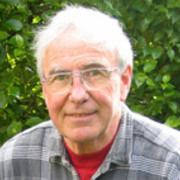
Murray Reece
Murray Reece started his career at the NZ Broadcasting Corporation in the late 60s, initially as a film cameraman. He captured images for episodes of Country Calendar, and shot exteriors for acclaimed teleplay A Game for Five Players. The latter was part of a push to develop more local television drama (behind the scenes footage of the teleplay being made can be seen in the closing minutes of this 1967 documentary).
In the same period Reece wrote and directed a feature with actors David McPhail and John Reid, and cinematographer Alun Bollinger. Frank has never seen the light of day, because there was never the money to finish the sound mix — although viewings of the footage likely helped Reece win a place on an NZBC producers course.
Reece then moved into the documentary department at the NZBC's Wellington station WNTV-1. But his eyes were on drama. He came up with a novel way to use documentary slot Survey to demonstrate his talents. Reece's contribution, a short film called Time Out, would blur the lines between drama and doco, by showing real-life policemen investigating an invented scenario involving an escaped prisoner.
Reece had recently acted alongside musician Bruno Lawrence in seminal Geoff Murphy short Tank Busters. The two played members of a gang of bankrobbers. Believing much of the acting of the era tended to the over-dramatic, Reece felt Lawrence's naturalistic, unschooled talents would be perfect for his new project. Time Out won Lawrence the 1971 Feltex award for best actor.
Reece's next project proved a major boost to his career. Created by Julian Dickon, Pukemanu was born from a desire to create a drama series which would allow New Zealand characters to speak in their own voices. Set in a working class forestry town, filmed partly on location, and partly in cramped Wellington studios, Pukemanu proved to be a launchpad for many key names in Kiwi drama, including writer Michael Noonan and producer Tony Isaac. Reece directed four episodes, drafting Bruno Lawrence and a young Ginette McDonald to appear in early screen roles. He later joked that directing the pioneering show was a case of "the blind leading the blind".
Reece followed Pukemanu by directing two theatre classics for television: Strindberg's Miss Julie, and Harold Pinter's The Dumb Waiter, which featured Coronation Street import Peter Adamson.
In 1973 a QEII Arts Council grant took Reece to Europe to study film, television and theatre. Reece was then invited to Poland to direct a teleplay (in this case a script by Hamish Keith) "in the manner of the BBC" — something of a linguistic and cultural challenge.
By the mid 70s, Reece was directing on a remarkable range of iconic Kiwi titles: among them were New Zealand's first soap Close to Home, trade union drama Moynihan and rural perennial Country Calendar, including the classic episode in which Fred Dagg and the six Trevs show viewers around the farm.
In April 1976 the newly christened TV-1 celebrated its first birthday by screening the country's first homegrown tele-movie, The God Boy. Reece produced and directed; critics largely raved. The God Boy was based on Ian Cross's rite of passage novel about an 11-year-old Catholic boy caught up in a troubled family. Reece used expressionist camera techniques to help take viewers inside the boy's head. The tele-feature won Feltex awards for best play, actress (Judie Douglass) and script (Ian Mune).
Listener critic Richard Campion praised the acting of Wainuiomata discovery Jamie Higgins in the central role, and extolled Reece's ability to show events through the eyes of a special boy "for whom the happenings of life become coloured and bent in the way that water plays on light". Author Trisha Dunleavy called The God Boy an influential early example" of New Zealand's cinema of unease.
By the late 70s, drama production had slowed to a trickle. After directing and co-writing a forgotten one-off adaptation of Roger Hall's Glide Time, Reece accepted an invitation to spend nine months directing on the early days of Australian TV soap The Sullivans, arriving on The Sullivans set via the same plane as God Boy actor Higgins.
The 80s saw Reece working freelance, and continuing to show his versatility across multiple genres: the era-defining melodrama Gloss, family drama Homeward Bound, police show Shark in the Park , and fish out of water documentary series The Deep End among them.
Among the shows he is proudest of are two comical one-offs made for 1982's Loose Enz anthology series. Graham's Mum and the Goulden Tour, co-written by Reece and Michael Noonan, was a tale of lost tourists featuring John Bach and Ian Watkin; The Pumice Land made serious comedy of an eccentric cow cockie trying to stop foreign developers from buying up Kiwi land. The cast included Paul Holmes and director/occasional actor Geoff Murphy.
In the 80s Reece began to move into animation, after commanding animated short Rachel Dustbin's Dog and the Law, an educational video about law-making. Reece would later help Euan Frizzell with some of his animation projects, including a series of shorts based on stories by writer Lynley Dodd.
If one discounts The God Boy as a television production, and the incomplete Frank, then Reece's directing CV includes only one feature film: 90s comedy drama Cops and Robbers, a Trans-Tasman oddity which sank without trace. Reece is happy with that fact at least, adding only "I shouldn't have done it, but I did."
Since working with Frizzell, the ever versatile Reece has "slowly eased" out of directing work, but continues to write for the radio, and write and illustrate children's books.
Profile written by Ian Pryor; updated on 21 December 2018
Sources include
Murray Reece
Robert Boyd-Bell, New Zealand Television - The First 25 Years (Auckland: Reed Methuen Publishers, 1985)
Richard Campion, 'Good God Boy' (Review of The God Boy) - The Listener, 1 May 1976, page 54
Trisha Dunleavy, Ourselves in Primetime: A History of New Zealand Television Drama (Auckland University Press, 2005)